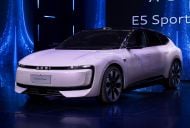The era of multi-billion dollar electric vehicle stock market floatations is seemingly over, with Renault confirming its Ampere division will be staying ashore for now.
Overnight the French automaker announced the “current equity market conditions are not met to optimally pursue the IPO process in the best interests of Renault Group” and, as such, it has decided to “cancel the Ampere IPO process”.
Under the company’s earlier plans, Ampere – Renault’s electric vehicle (EV) division – was to be partially listed on a stock exchange during the first half of 2024.
In the official statement, Renault Group and Ampere CEO Luca de Meo said he was “extremely proud of our teams who created in less than two years… a 100 per cent focused EV and software business” with a “start-up mindset which allows us to constantly innovate”.
The CEO justified today’s announcement as “a pragmatic decision” before adding the company is now “focused on executing our strategy and building our track record to create value for all our stakeholders”.
Just last September Mr de Meo said Ampere’s listing could be worth up to €10 billion ($16.4 billion).
Renault claims its 2023 results show it has “sustainable cash flow to finance its future (including Ampere development)” without the IPO’s fresh infusion of cash. The French automaker has committed to funding Ampere until it reaches “reaches breakeven in 2025”.
According to Renault, on November 1, 2023 Ampere began operating as an “autonomous business” focussing exclusively on EVs and software development.
Ampere’s confirmed pipeline includes the Scenic E-Tech crossover, Renault 5 retro hatch, Renault 4 crossover, and the €20,000 ($33,000) Twingo, as well as “two additional cars”.
The mood music around EVs is more dour than it was a year or so ago because while EV sales are still growing globally, they’re not doing so at the prodigious rate once forecast. On top of that, much of the recent growth has been led by price cuts from Tesla and other EV models at the cheaper end of the price scale, primarily those from Chinese automakers.
This has led institutional investors to be more cautious of EV-only investments.
Polestar, which listed on the Nasdaq stock exchange in the middle of 2023 via a backdoor method, has seen its share price fall by around 75 per cent.
Last week Polestar confirmed it was cutting 450 employees, or 15 per cent of its total workforce, as it struggled with slow growth and pricing pressures.
Even Tesla, the world’s second most popular EV brand, has had a bumpy time of late with steep price cuts to keep sales growing. Its preference for volume over profit margin has seen its share price ride a rollercoaster.
Tesla’s stock is about seven per cent higher than this time last year, but is down roughly 39 per cent from its high in July 2023.










